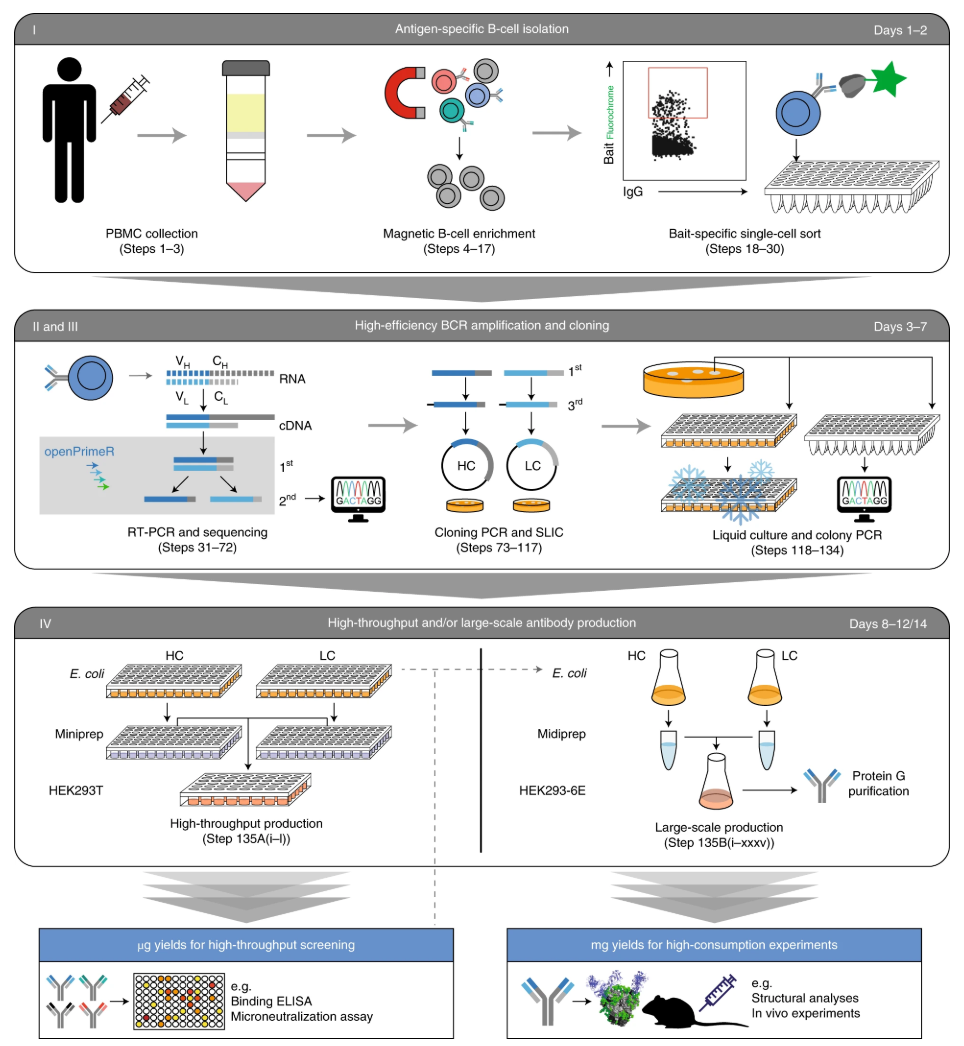B Cell Sorting Service for Exosome Antibody Development
- Isolation of high-purity exosomes using ultracentrifugation, SEC, affinity chromatography, or microfluidics.
- Confirmation of exosome identity and surface markers via TEM, NTA, Western blot, LC-MS/MS.
- These exosomes are then fluorescently labeled using stable dyes or tagged with biotin-streptavidin systems to facilitate B cell binding and enable sorting.
- Immunization of animals (e.g., human, mice, rats, rabbits) with purified exosomes to generate an exosome-specific B cell response.
- Collection of peripheral blood, spleen, lymph nodes, or bone marrow.
- Fluorescence-activated cell sorting (FACS) to isolate single B cells binding to labeled exosomes.
- Reverse transcription and amplification of VH and VL genes from sorted B cells.
- Sequencing to obtain natural antibody variable regions.
- Cloning VH and VL genes into expression vectors.
- Production of recombinant antibodies in HEK293/CHO cells, followed by Protein A/G purification.
- Affinity and specificity assays (ELISA, SPR, BLI) against exosomes.
- Functional validation for diagnostic, therapeutic, or research use.
- Optional cross-reactivity and neutralization tests depending on application.
Exosome-specific antibodies represent a powerful tool for targeting, characterizing, and harnessing exosomes in both basic research and therapeutic development. These antibodies enable precise recognition of exosome surface proteins, allowing for advanced diagnostic, therapeutic, and drug delivery applications. However, the generation of high-affinity, exosome-specific antibodies remains technically challenging due to the complexity and diversity of exosome surface markers. MtoZ Biolabs offers a professional B Cell Sorting Service for Exosome Antibody Development, designed to generate high-specificity monoclonal antibodies against native exosome antigens.
Exosome-specific antibodies are typically raised against exosome surface markers, including tetraspanins (CD9, CD63, CD81), integrins, and disease-specific proteins. These surface proteins reflect the cellular origin and functional state of exosomes, making them essential targets for antibody development. Our service focuses on developing antibodies that recognize native, conformationally intact exosome surface antigens, critical for preserving biological function and clinical relevance. Through optimized exosome isolation and surface profiling, we ensure that the antigens presented to B cells accurately reflect the natural exosome context, enabling the discovery of functional and high-affinity antibodies.
Service at MtoZ Biolabs
MtoZ Biolabs offers a comprehensive B Cell Sorting Service for Exosome Antibody Development, providing high-affinity, exosome-specific monoclonal antibodies for research, diagnostic, and therapeutic applications. B cell sorting is a state-of-the-art technique that isolates individual antigen-specific B cells from immunized animals or human donors based on their binding to fluorescently labeled exosomes. This technology enables the discovery of monoclonal antibodies directly recognizing exosome antigens, overcoming limitations of traditional methods such as hybridoma or phage display.
Leveraging fluorescence-activated cell sorting (FACS), MtoZ Biolabs isolates antigen-specific B cells that recognize intact exosome surface proteins. Subsequent amplification and cloning of immunoglobulin variable regions (VH and VL) enable recombinant monoclonal antibody generation. Antibodies are expressed and purified using mammalian expression systems, followed by comprehensive validation of binding specificity, affinity, and functionality through ELISA, flow cytometry, SPR, and mass spectrometry-based epitope mapping when needed. If you are interested in our B Cell Sorting Service, please feel free to contact us.
Analysis Workflow
1. Antigen Preparation and Exosome Labeling
2. Immunization
3. B Cell Isolation and Sorting
4. Single-Cell BCR Sequencing
5. Antibody Expression and Purification
6. Antibody Validation and Characterization

Figure 1. Workflow for B Cell Sorting Service
Service Advantages
MtoZ Biolabs delivers an advanced, integrated platform for exosome-specific antibody development, with key advantages ensuring high-quality and reliable outcomes:
☑️Comprehensive Antibody Screening
Efficient screening of antibodies against diverse exosomal markers, including well-defined and novel candidates.
☑️Advanced B Cell Sorting Technology
High-quality exosome-specific antibody development powered by state-of-the-art sorting platforms.
☑️Multi-Species B Cell Sources
B cell sorting available from human, monkey, mouse, rat, rabbit, chicken, and more.
☑️Experienced Technical Team
Expert team specialized in exosome antibody discovery to ensure robust and reliable outcomes.
☑️End-to-End Project Support
Full-service pipeline from initial consultation and design to antibody production and data analysis.
☑️Cost-Effective and High-Quality
Optimized workflows to deliver high-quality antibodies with minimized cost and timeline.
Applications
The B Cell Sorting Service for Exosome Antibody Development offered by MtoZ Biolabs enables the generation of high-affinity, exosome-specific antibodies that are essential for various cutting-edge research and clinical applications, including but not limited to:
1. Exosome Isolation and Capture
Creating antibodies for immunoaffinity-based exosome isolation, enabling the enrichment of disease-specific exosome populations.
2. Exosome Biomarker Discovery
Identifying and validating exosome surface markers as diagnostic or prognostic biomarkers for cancers, neurological diseases, infectious diseases, and more.
3. Exosome-Based Diagnostics
Facilitating the development of exosome immunoassays (e.g., exosome ELISA) for liquid biopsy applications, including cancer detection and disease monitoring.
4. Exosome-based Therapeutics
Generating therapeutic antibodies that can block exosome-mediated pathological processes, such as tumor progression and metastasis.
5. Targeted Drug Delivery Systems
Developing antibodies for exosome engineering to facilitate precise delivery of therapeutics to specific cells or tissues.
6. Basic Research on Exosome Biology
Supporting mechanistic studies of exosome formation, secretion, and cell-to-cell communication through targeted antibody tools.
FAQ
Q: What are the advantages of using B cell sorting over traditional hybridoma techniques for exosome antibody development?
B cell sorting offers several advantages over traditional hybridoma techniques for exosome antibody development. It enables direct isolation of antigen-specific B cells without the need for cell fusion, significantly shortening the development timeline. Moreover, B cell sorting allows access to high-affinity, rare antibodies against low-immunogenic exosome markers that are difficult to obtain by hybridoma. This method also preserves the natural pairing of heavy and light chains, ensuring high specificity and functionality of the resulting antibodies.
How to order?







